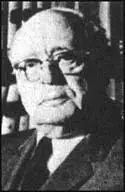Otto Eisenschiml

Otto Eisenschiml was born in Austria in 1880. After obtaining a university degree in Vienna he emigrated to the United States in 1901. He worked as a chemist and eventually became president of the Scientific Oil Compounding Company.
Eisenschiml took a keen interest in the assassination of President Abraham Lincoln. In his book, Why Was Lincoln Murdered? (1937), he suggested that Edwin Stanton, the secretary of war, had engineered the plot to kill the president. The evidence for this theory included the employment of John Parker to guard Lincoln, Stanton's failure to close all the roads out of Washington, the shooting of John Wilkes Booth, tampering with Booth's diary, and the hooding of the conspirators to stop them from talking.
The book sold well but was attacked by professional historians. J. G. Hamilton described it as "four hundred and thight-eight dreary pages of rambling and disconnected implication and innuendo."
Otto Eisenschiml died in 1963. However, the influence of his book remained and inspired d the book by David Balsiger and Charles E. Sellier, The Lincoln Conspiracy (1977) and the motion picture of the same name.
Primary Sources
(1) Otto Eisenchiml, Why Was Lincoln Murdered? (1937)
The man who died at Garrett's Farm was stripped of his belongings before he was dead. The things that were taken from him were of nopwere of no great consequence, with the sole exception of a diary in which he had written some declamatory descriptions of his experiences and sentiments. This diary was subsequently to become the centre of a fiery controversy, not so much because of its contents as because it had been kept hidden fro the public.
For two years the little volume lay locked up in the archives of the War Office. In the meantime Baker had been dismissed and had written his book, The History of the Secret Service. Therein repeated references were made to Booth's diary, creating a sensation in all circles. The judiciary committeee of the House, then in session, seized upon the item with alacrity, and bade Baker take the stand and repeat his statements under oath. There the detective exploded another bombshell: the the diary had been mutilated since it had been taken from the body at Garrett's Farm.
(2) Otto Eisenchiml, Why Was Lincoln Murdered? (1937)
Another bizarre feature in the story of Booth's pursuit is the failure of the War Department to prosecute some people who had sheltered Booth and helped him in his flight. Again, the House of Representatives Committee, debating the distribution of rewards, was puzzled. In a proclamation dated 20 April, Stanton had declared that "All persons harboring or secreting the conspirators or aiding their concealment or escape, will be treated as accomplices in the murder of the President and shall be subject to trial before a military commission, and the punishment of death.
(3) Otto Eisenchiml, Why Was Lincoln Murdered? (1937)
When Johnson became the Chief Executive of the nation the Radicals began to have pleasurable visions of wholesale massacres and executions that would depopulate the South; for the new President had expressed his hatred of traitors in terms that were immoderate and unmistakable. Yet week after week passed and, except for the hanging of the so-called conspirators and of Captain Wirz, the former commandant at Andersonville, no deed of violence took place. On the contrary, pardon followed pardon; and worse than that, the President undertook to re-establish state governments along the lines Lincoln had advocated. At first the Radicals were bewildered; then astonishment gave way to unbridled fury.
(4) Otto Eisenchiml, Why Was Lincoln Murdered? (1937)
There was one man who profited greatly by Lincoln's death; the man who was his secretary of war, Edwin M. Stanton. Brusque, insolent, cruel, Stanton was without doubt the most unpopular member of Lincoln's administration; but the President in spite of strong pressure, had been loath to let him go while the conflict was raging; he seemed to think that no one else could do the work as well.
After the war was over, however, it seemed only a question of time when Lincoln would divest himself of a secretary who was fast becoming both a personal and a political liability to him. It was to his advantage to have the President out of the way; it would mean a continuance in office, increased power over a new and supposedly weak Chief Executive and a fair prospect of replacing the latter at the next election.
As secretary of war Stanton failed in his duty to protect the President's life after he was convinced that there was danger in the air. He bluntly denied Lincoln's request to be protected by Major Eckert and did not provide a proper substitute.
It was probably due to the efforts of Stanton that all evidence of negligence on the part of John F. Parker was carefully suppressed. He directed the pursuit of Booth and allowed it to be conducted in a manner that, but for the assassin's accidental injury, would have allowed his escape.
The actual pursuit and subsequent capture of Booth were silenced by unusual methods and were subsequently removed from contact with the public, either by infliction of the death penalty or by banishment to a desolate fortress. Other prisoners, of at least equal guilt, escaped punishment.
Plausible as such an indictment may seem, it would stand no chance of surviving a legal attack. There is not one point in this summary than can be proven; it is all hypothesis. Circumstantial evidence, at best, is a dangerous foundation upon which to build.
